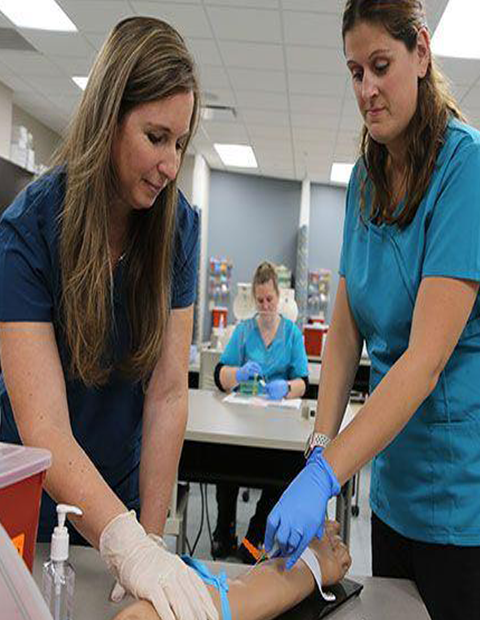Regional Northeast Medical Institute CNA Courses Near Me Stamford: Your Path to Accreditation
Regional Northeast Medical Institute CNA Courses Near Me Stamford: Your Path to Accreditation
Blog Article
Essential Aspects to Think About When Choosing one of the most Appropriate Medical Institution Curriculum for You
Selecting the most suitable medical college curriculum is a crucial decision that can greatly affect your educational journey and future job course. As aspiring medical experts, the selection of educational program ought to straighten with your individual knowing style and job aspirations.
Personal Knowing Style
Clinical institutions that offer varied training approaches and resources can accommodate various finding out designs, fostering a comprehensive and dynamic educational environment. Inevitably, comprehending individual knowing choices equips students to make informed decisions concerning their clinical education, establishing a strong foundation for their future professions in health care.
Profession Goals Placement

Additionally, lining up job purposes with the clinical institution curriculum can additionally boost motivation and engagement throughout the instructional trip. When trainees see the direct importance of their coursework to their future occupation, they are much more likely to remain devoted and focused to their research studies. Consequently, when choosing a clinical institution educational program, it is important to thoroughly think about just how well it aligns with one's career purposes to guarantee an effective and satisfying specialist path.
Teaching Techniques
Thinking about the placement of profession purposes with the chosen medical college curriculum, an exam of the teaching methodologies utilized comes to be essential in forming the learning experience. The efficiency of a clinical school curriculum greatly counts on the training approaches used by the establishment. Various mentor techniques, such as talks, small seminar, problem-based discovering, simulation-based training, and hands-on scientific experience, can dramatically impact exactly how well trainees realize and retain details.
Lectures are a traditional but still frequently used method for providing material to a big team of trainees successfully. Tiny seminar foster cooperation, vital thinking, and communication abilities among pupils. Problem-based knowing urges active participation, self-directed learning, and analytical capacities. Simulation-based training enables trainees to exercise clinical abilities in a regulated environment prior to connecting with real patients. Hands-on clinical experience offers a direct understanding of individual treatment and clinical methods.
When choosing a medical school curriculum, striving trainees should consider the training approaches employed to make certain that their discovering preferences and toughness line up with the educational approach of the establishment.
Curriculum Flexibility
When reviewing clinical school programs, analyzing the degree of curriculum versatility is essential for prospective pupils browse around these guys seeking a customized educational experience. Educational program versatility describes the degree to which pupils can customize their learning courses within the medical college curriculum. An educational program that offers versatility permits trainees to seek their interests, concentrate on locations where they require more support, and involve in learning experiences that line up with their job goals.

Potential clinical pupils ought to take into consideration just how a medical institution's educational program flexibility aligns with their discovering choices, career ambitions, and personal objectives. home By picking a program that offers the best balance of framework and adaptability, pupils can optimize their educational experience and prepare themselves for successful professions in medication.
Scientific Exposure Opportunities
Exploring the sensible application of clinical understanding, scientific exposure opportunities play a crucial duty in shaping a comprehensive clinical education. These opportunities give trainees with important hands-on experience in real health care setups, allowing them to link the space in between concept and method. When considering clinical institution curricula, the high quality and quantity of professional exposure must be meticulously examined.
Effective clinical direct exposure ought to supply a diverse variety of experiences throughout various specializeds, ensuring that trainees are exposed to various medical situations and patient demographics. Exposure to outpatient centers, inpatient wards, medical cinemas, and emergency divisions can assist pupils develop a well-rounded this hyperlink understanding of various elements of healthcare delivery. Additionally, possibilities for community-based care and communications with underserved populations can foster a much deeper appreciation for the social components of health.
Furthermore, the existence of encouraging faculty and advisors during these professional experiences can considerably enhance the learning process. Professors guidance and useful responses can help trainees mirror on their clinical encounters, determine areas for enhancement, and boost their decision-making capabilities and professional abilities (Northeast Medical Institute CNA Classes Near me Stamford). Overall, robust clinical exposure opportunities are necessary for preparing future medical professionals to supply quality patient care efficiently
Final Thought
Finally, when choosing a clinical institution educational program, it is necessary to consider your individual understanding design, placement with job purposes, educating methods, educational program versatility, and medical exposure opportunities. These factors play an important role in identifying the most suitable program for your professional and academic development. See to it to thoroughly assess each facet to make an educated choice that will best sustain your growth in the clinical area.
Understanding one's individual discovering style is essential when selecting a clinical institution educational program. By recognizing one's discovering design early on, striving medical students can purposefully select a curriculum that provides to their staminas, inevitably improving their learning experience and scholastic success.
When assessing medical institution programs, assessing the level of curriculum flexibility is essential for possible students looking for a tailored instructional experience. Curriculum versatility refers to the degree to which trainees can personalize their discovering paths within the medical college educational program.In final thought, when picking a medical college curriculum, it is necessary to consider your personal discovering design, alignment with job objectives, showing methodologies, curriculum adaptability, and professional exposure chances.
Report this page